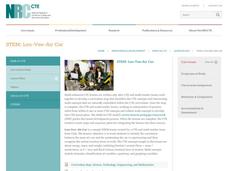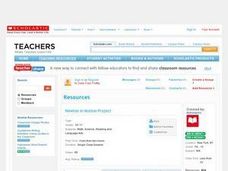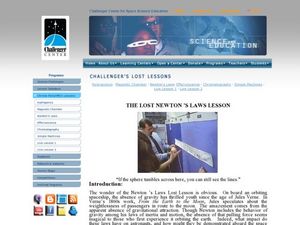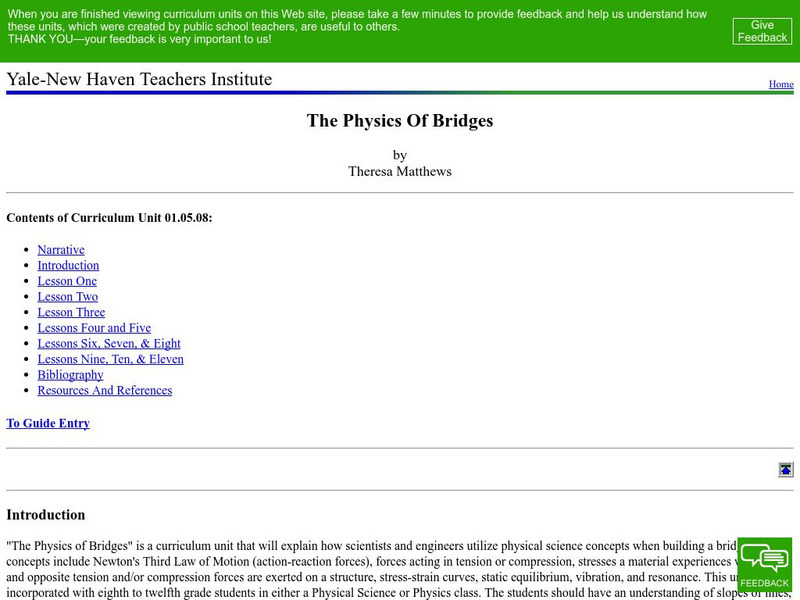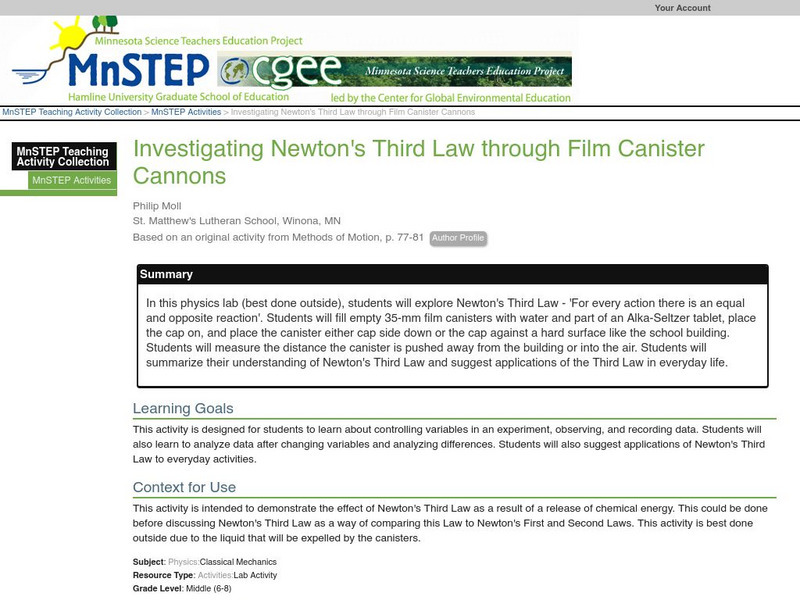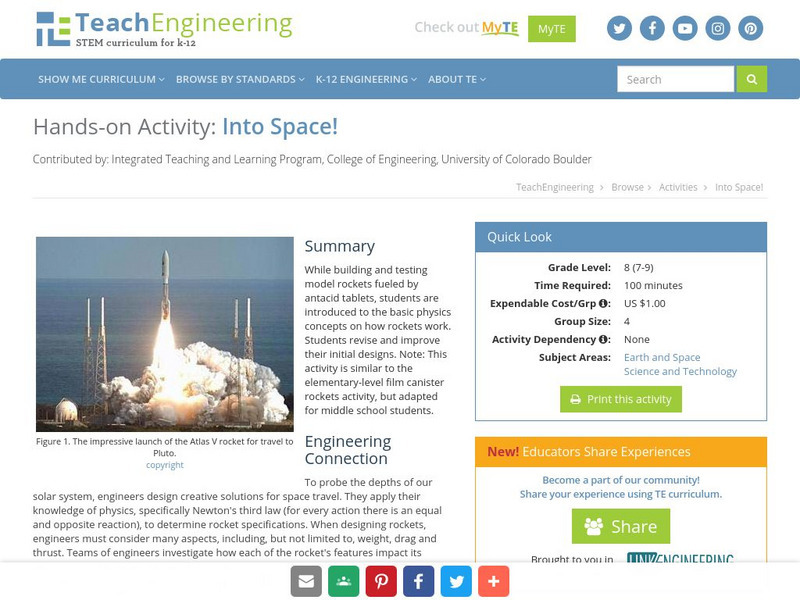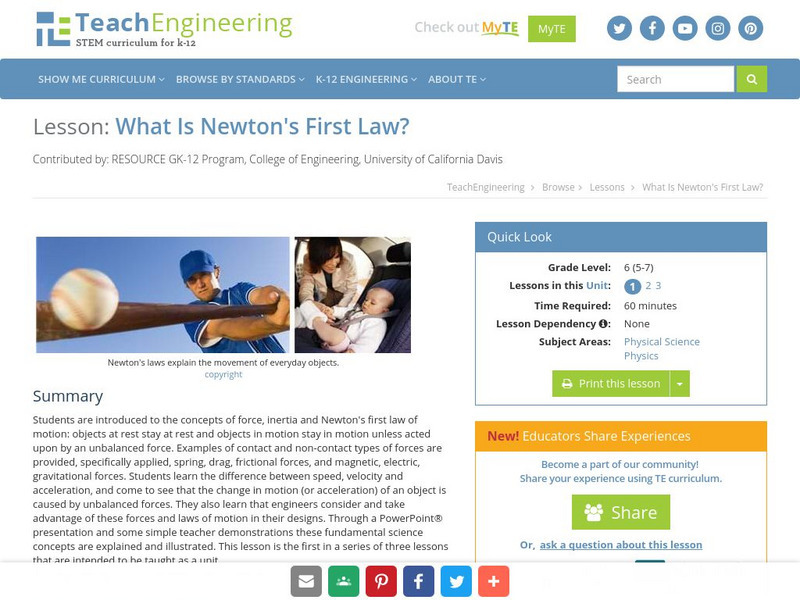National Research Center for Career and Technical Education
STEM: Lou-Vee Air Car
A comprehensive lesson plan on acceleration awaits your physicists and engineers! Two YouTube videos pique their interest, then sample F=ma problems are worked and graphed. The highlight of the lesson plan is the building of a Lou-Vee...
Curated OER
Law of Conservation of Momentum
A suggested sequence of events lays out five hands-on activities and four creative assessments on the conservation of momentum. Using spring scales and mail scales, junior physicists examine Newton's Third Law. After you have taught the...
Curated OER
Rocketry
Students design and construct a paper rocket that can be launched with a drinking straw. They participate in a lecture and read an article about rocketry and how Newton's Third Law applies to rocket launches. Each student constructs...
Curated OER
Newton in Motion-Project
Students investigate Newton's Third Law of Motion. In this Newton's Third Law of Motion lesson, students explore the law in the real world. Students break down the definition for understanding and do an experiment using a balloon.
Curated OER
Scooting Along!
Students investigate how Newton's Third Law affects vehicle design. In this Newton's Third Law lesson, students use a web site to research Newton, his third law, and how to design a vehicle that uses a balloon for power. They sketch and...
Curated OER
The Lost Newton's Laws Lesson
Students explore momentum. In this physics lesson, students perform an experiment in which two balls are released on slanted boards while students observe which ball will go the farthest and the fastest. Students define and explain...
Curated OER
Finding Balance
Young scholars examine the relationships between force, mass and balance through the lens of clay sculpture. They discuss the definitions and concepts behind Newton's Third Law of motion then individually apply these principles to the...
Curated OER
Momentum and Conservation of Momentum
In this momentum worksheet, students review the equation to solve for momentum and the Law of Conservation of Momentum. Students complete 8 matching, 6 fill in the blank, and 8 problems to solve.
Curated OER
Newton's Third Law
In this Newton's Third Law worksheet, students complete a table identifying the action force and reaction force of several examples. Students demonstrate a basic understanding of Newton's Third Law by filling in missing blanks and...
Curated OER
How Do Things Move?
In this motion worksheet, students will use a word bank to fill in the definition of Newton's three laws of motion. Then students will complete 4 short answer questions giving examples of Newton's three laws of motion.
NASA
Ltp: Rocket Principles
Excellent NASA sponsored site on the principles of rockets. The site relates Newton's 3 laws to the flight of a rocket. Site also has links to activities related to rockets in addition to links about practical rocketry.
CK-12 Foundation
Ck 12 Exploration Series: Simulations: Physics: Horse and Cart
[Free Registration/Login Required] Learn about Newton's third law of motion, calculations in two dimensions, and the interaction of multiple objects in the context of a horse pulling a cart.
CK-12 Foundation
Ck 12 Exploration Series: Simulations: Physics: Water Fountain
[Free Registration/Login Required] Learn about projectile motion and its relevance to the shape of a stream of water.
PBS
Pbs Learning Media: Acids and Bases: Making a Film Canister Rocket
ZOOM cast members mix different amounts of baking soda and vinegar to see which combination produces the most carbon dioxide for launching a film-canister rocket. [3:23]
TED Talks
Ted: Ted Ed: Newton's 3 Laws, With a Bicycle
This video describes Newton's three laws of motion and how they relate to the everyday motion of a bicycle. [3:33] Followed by a short quiz and a list of additional resources to explore.
Science Buddies
Science Buddies: Explore the Forces of Friction
We all recognize what friction is, but do you really understand what causes it? This project focuses on friction, its causes and forces and specifically how it affects how fast you can slip down slides.
Yale University
Yale New Haven Teachers Institute: The Physics of Bridges
Introduce students to physics concepts that engineers use when building a bridge. This curriculum unit includes concepts such as Newton's Third Law, stress on a material, vibration, and resonance. Unit includes lectures, lab activities,...
Science Education Resource Center at Carleton College
Serc: Investigating Newton's Third Law Through Film Canister Cannons
In this physics lab (best done outside), students will explore Newton's Third Law - 'For every action there is an equal and opposite reaction'. Students will fill empty 35-mm film canisters with water and part of an Alka-Seltzer tablet,...
BioEd Online
Bio Ed Online: Balloon Blast
In the following instructional activity students are asked to devise a plan to measure the distance of a balloon's flight, predict the direction a balloon will travel as it deflates, learn about Newton's Laws of Motion, experience...
NASA
Nasa: Welcome to the Beginner's Guide to Propulsion
What is propulsion and how does it work? This NASA site provides an animated example plus many details related to its use in jet engines.
University of Colorado
University of Colorado: Ph Et Interactive Simulations: Gravity Force Lab
Manipulate the mass and distance of two objects to see how these properties change the gravity force.
TeachEngineering
Teach Engineering: Into Space!
While building and testing model rockets fueled by antacid tablets, students are introduced to the basic physics concepts on how rockets work. Students revise and improve their initial designs. Note: This activity is similar to the...
TeachEngineering
Teach Engineering: What Are Newton's Laws?
Through a series of three lessons and one activity, students are introduced to inertia, forces, and Newton's three laws of motion.
TeachEngineering
Teach Engineering: What Is Newton's First Law?
Students are introduced to the concepts of force, inertia, and Newton's first law of motion: objects at rest stay at rest and objects in motion stay in motion unless acted upon by an unbalanced force.This lesson is the first in a series...


